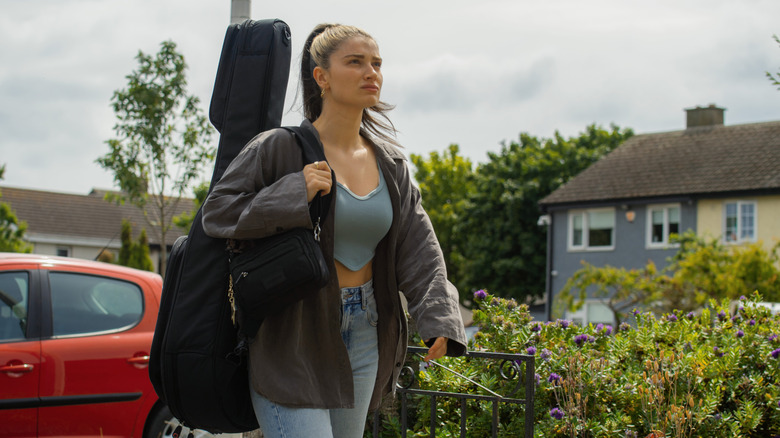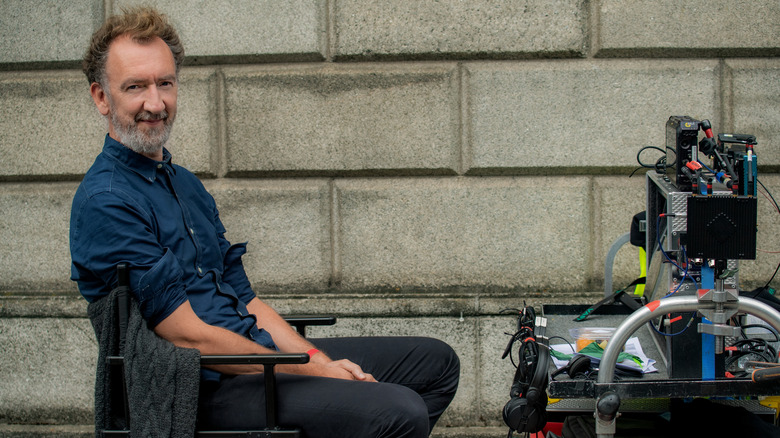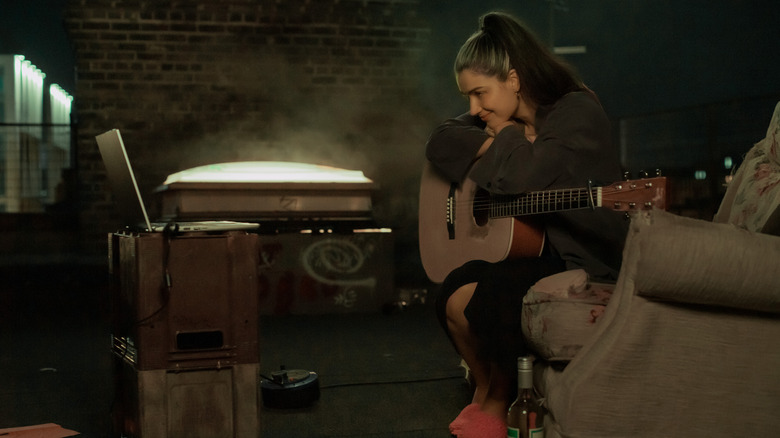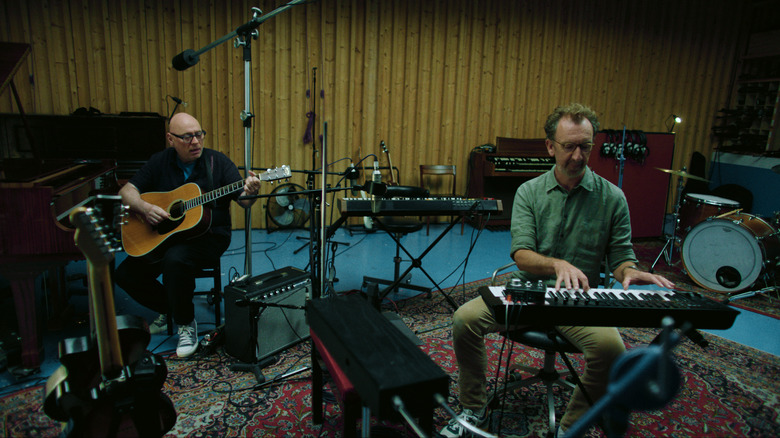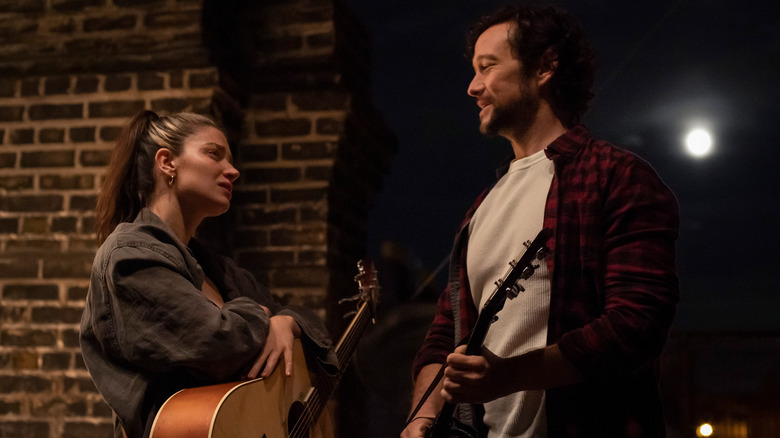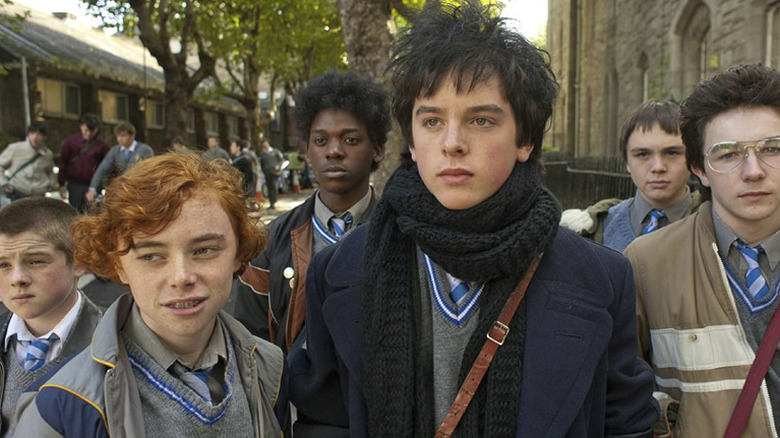Flora And Son Director John Carney On His 'Stealth Musicals' And His Approach On Set [Exclusive Interview]
"Stealth musicals." That's how writer/director John Carney defines the wonderful little genre he's carved out for himself with films like 2007's breakout hit "Once," 2014's underrated "Begin Again," 2016's instant classic "Sing Street," and this year's "Flora and Son," which continues Carney's streak of movies which don't feature characters breaking out into choreographed song and dance numbers, but nonetheless rely heavily on music to bridge emotional chasms.
In his latest, Eve Hewson ("Bad Sisters," "The Knick") plays Flora, an aimless young mother in Ireland who is struggling to relate to her teenage son, Max (Orén Kinlan). Flora takes up online guitar lessons with a U.S.-based failed musician named Jeff (Joseph Gordon-Levitt), and as a quasi-romance begins to blossom between her and Jeff, she realizes Max has a passion for music as well, and through the power of that shared interest, she's finally able to connect with him. It sounds kind of cheesy (and maybe some of it is, a little), but it's also grounded and real and human and genuine — qualities that seem practically alien to mainstream American movies these days.
I caught up with Carney last week over Zoom to talk about "Flora and Son," his approach on set, the power of connection, a sequel to "Sing Street," and more.
Note: This interview has been lightly edited for clarity and brevity.
'Anytime music doesn't have love in it, I'm done'
I love this genre that you've carved out for yourself. Do you have a name for the types of movies that you like to make where they're not traditional full-blown musicals, but they heavily feature music?
Stealth musicals. Gateway musicals. [laughs] They're musicals that you don't realize you've sat down and actually watched an old MGM Hollywood musical. They're the movies that I love, I loved watching them, but I don't literally want to watch them, and I don't literally want to make them, because they get too parody-ish, so I've been trying to hide them from people.
So for "Sing Street," I remember you saying that you made that film a period piece because you started a band in the '80s and could relate to what it felt like to do that. And now, years later, you have "Flora and Son," which is a modern story and features the Max character making these beats on his computer. I'm curious about the differences in mentality between those two projects. Did you become more comfortable with the idea of depicting the modern aspect of what it's like for people making music now?
I think when you're making a film, particularly films with music or fashion or films that represent those kind of forms, you've got to make one big decision at the very beginning, which is, "Am I going to lead the conversation, or am I going to follow the conversation?" And it's very hard to follow the conversation of what people are up to musically, because it's changing so quickly. So you think you're following the conversation on Tuesday, it's finished and it's out of fashion on Wednesday. It's moving at such speed. In the '80s, it didn't move like that. It took a few years for ideas to percolate and for forms to change. Nowadays, it's like bang, bang, bang, and the Internet is obviously feeding that.
So I, on "Sing Street," decided I'm not going to try and lead a conversation of what music I like and set the film now. So once I set it in the '80s, I know the parameters of the sound of the music, and I'm not interested in whether it seems plausible or not, because it was plausible for the '80s. This is different, because it's a film that's set now, so people have to feel like, "Yeah, that sounds accurate." But I decided to try and lead the conversation as opposed to follow just what people are doing now. Because I find what people are doing now a little bit ... what's the word? How to be delicate. I find, for example, drill music to be very angry and very repetitive and there to be very little love in it. I find there's a lot of angry young men who have spent two years of Covid at home, getting angrier and getting more resentful.
And I think that there's a tendency — anytime music doesn't have love in it, I'm done. I don't care. And I think that what I tried to do with this is to try and make our own sound, try and make it sound plausible, and fill it full of love. And the way you start to do that is with melody, and beautiful melodies, and that's what we tried to do. We said, "Okay, Flora and Max aren't huge musicians or something like that, but let's say that they create a beautiful sound together."
'It's not stopping the drama or the love story'
Music serves as the basis of connection in all of your films, and in "Flora and Son," you visualize that connection by having characters occupy the same physical space while collaborating, even though they're thousands of miles apart. Tell me about that decision. What drove that decision for you?
Well, I had written about 20 pages about this character, and then she opened her laptop and went online and found a guitar teacher, and I paused it then, because it was before the pandemic, and it seemed to me I'm not going to make a movie about two people speaking on Skype or FaceTime. It's just like, nobody's going to want to watch that. And then the pandemic happened, and everybody got used to this new format of Zoom. Now, it's second nature — and it really is, and it's never going to go away. We are going to be communicating with screens in the way that we used to with letters, we used to with emails — that we still do, obviously. But we're learning. It's like muscle memory where actually it's being imprinted upon us now.
Then I went back to the script and read it, and the very thing that sort of held me back from making the movie before Covid now was giving me permission to make it, which is, of course people will watch people on screen now, because it's not that outlandish idea and it's not a gimmick, and it's not stopping the drama or the love story. It's actually making it more interesting.
'I never look at call sheets'
I've also heard you talk about how the songwriting process for this movie was super collaborative with the cast, and I'm just wondering, practically speaking, when you're on the set, how do you strike the balance of allowing the actors to have the time and the freedom to give their input for something like that, but also keep enough of a steady pace that you can still actually make your days?
Well, I am never interested in making my days.
[laughs] Okay. Well, that makes it easy.
Yeah. I never look at call sheets. I'm not interested in ticking boxes and getting through scenes. I never move on from a scene unless two things: one, I know I've got it, or two, I'm not going to get it, and then I'll move on. They're the two circumstances with which — because you should never move on to make your day with adequate or okay scenes, because then it'll just be in the DNA of your film. What's more important? Your film, or the call sheet? So I've always put the film first, and I've gone, "Don't worry about the call sheet yet. I'm a responsible adult. I will not spend $2 million wasted. Trust me. But if we're not getting stellar, for me, what I think is stellar stuff that I can stand by for the next three years promoting this movie, we're not moving on."
So to answer your question, part of going into the studio with Joe and Eve was part of getting the film right, so it felt like it was part of the movie. They both wanted to sing lyrics that they felt weren't handed to them on a plate the way the script was. And for some reason as actors, they liked doing it with the script — "Give us our work, and we can talk about it, but I want to do your lines and the character" — but when it came to singing, it was almost like you reveal some other part of yourself when you sing. And I think they felt more vulnerable, which is understandable, and I think — I'm second guessing here — but I imagine they felt, "I can own it as Flora and Jeff more if I had a stake in it."
I invited them both in, and I think I was right. It doesn't make any difference to me. Nobody was looking for a credit. It was just a question of trying to get my film right.
'It's good to be taught things by people'
I wanted to ask you about Joseph Gordon-Levitt's character. He has his charms, certainly, but there's a little bit of an abrasive quality to this guy sometimes. He's a little dismissive of Eve's suggestions sometimes, or her taste in music, and it's never enough to fully tip the scales where you don't like this guy, but it gives him a little bit of an edge where he's not just this idealized, perfect character. I'm wondering if you can tell me about that decision.
I mean, basically what he's saying is what I believe, and what Flora is saying back to him is stuff that is good for me to hear. And I'm playing with that dialogue. And I would go much further, as my wife or many of my annoyed friends can attest to. So I stopped him from talking by having Flora interrupt him and stop him from going and becoming too sanctimonious or too opinionated or too abrasive or mansplaining stuff to her. But the reason why I kind of wanted him to be a bit full of himself was because it's good to be taught things by people, and it's good to have a specialist come in and explain things to you.
Yes.
It's not bad. In a very small limited world, he's an expert at what he does. Now, I'm not saying he's across the board a musical genius, but in terms of the type of things she's doing and as a teacher, he's very good. So why shouldn't she listen to him? And we live in this world where everybody can be everything that they want to be, and he's like, "No. I've spent 25 years thinking about this one issue. Let me tell you what conclusion I came to," instead of just saying, "You're beautiful, and you can do whatever you want, and yay, music is subjective and we can all love music." He's like, "Bollocks to that," which is what I believe. I didn't want him to be like Bradley Cooper or something like that, with just flattering her and giving her these incredible opportunities.
'We don't need to keep reiterating the same stories. I'd rather hear something new'
"Sing Street" is one of my favorite films, and I'm curious if you've ever considered making a sequel to that.
Yes, I have, but I don't think I will. I think the fun challenge now, having made a bit of TV, the fun challenge of making a film is ending. The brave thing — or not brave, because none of this is brave — but the kind of honest thing to do as a filmmaker is to risk closing the curtains and saying, "I'm done. I've no more to say. Did you like it? Did I end it right?" That's the challenge. And when you keep on going week and week or in these franchises, or "Let's just keep going, let's have an origin story." Yeah, maybe, but the world is not short of stories. There's millions of them there. We don't need to keep reiterating the same stories. I'd rather hear something new.
Plus, the ending of "Sing Street" is perfect anyway.
I'm tempted to go to London and find out what those characters are doing. It'd be good fun, but I think the film — it just leaves the film on the right note, and it's good not knowing.
"Flora and Son" hits Apple TV+ on September 29, 2023.
